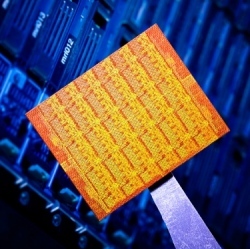
Thanks to the strange laws of quantum mechanics, quantum computers would be able to carry out certain computational tasks much faster than conventional computers. Among the most promising technologies for the construction of a quantum computer are systems of single atoms, confined in ion traps and manipulated with lasers.
In the laboratory, these systems have already been used to test key building blocks of a future quantum computer. “Currently, we can carry out successful quantum computations with atoms,” explain Andreas Stute and Bernardo Casabone, both PhD students at the University of Innsbruck’s Institute for Experimental Physics.
“But we are still missing viable interfaces with which quantum information can be transferred over optical channels from one computer to another.”
What makes the construction of these interfaces especially challenging is that the laws of quantum mechanics don’t allow quantum information to be simply copied. Instead, a future quantum internet — that is, a network of quantum computers linked by optical channels — would have to transfer quantum information onto individual particles of light, known as photons.
These photons would then be transported over an optical-fiber link to a distant computing site.
